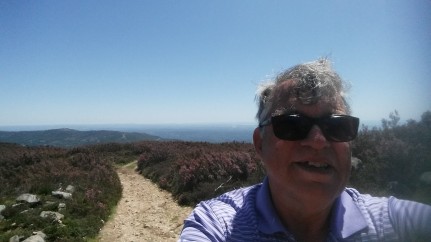It is astonishing how the rules in Portugal can be so different, with no clue what the rule is. When we drive or park, we run afoul of the rules. Eating out often leaves us mystified. Even hiking on the trails is a game of guess what they mean. For many people, religion has the same mystery.
When we were here last year, we went to visit a recommended city. We entered the city, and had no idea, as usual, where to park. Little did we know that a few blocks further was a great car park. We saw an opening along the street. After our adventure visiting the castle and the churches, we returned to find a parking ticket with no clue how to pay.
and had no idea, as usual, where to park. Little did we know that a few blocks further was a great car park. We saw an opening along the street. After our adventure visiting the castle and the churches, we returned to find a parking ticket with no clue how to pay.
This year, we parked on some streets to suddenly realize that there was an inconspicuous automated toll box. At another street in another city, we parked and started walking away. Fortunately, I forgot something and went back. A van blared its horn, and the man jabbered in Portuguese, pointing at a yellow line painted on the edge of the street, saying “Autobus.” Figuring that I couldn’t park there, I got in, and the next vehicle was a great big bus which blared its horn because it couldn’t round the corner with the car there. I quickly scooted down to another parking spot. Don’t let me start on the roads that have no speed limits posted. There seems a speed limit that is expected, but not posted until one comes on an intersection where a lower one is posted. The problem is the unstated limit changes due to some unknown rule.
At least, eating out is not likely to get you a ticket for breaking an unexpected rule. We study the menu, which is usually not in English. Now we have to guess whether we translated the word right and aren’t going to end up with octopus or something. Sometimes the main dish comes with sides, and sometimes not. Not ordering sides might leave you hungry for veggies, and ordering sides can cause you to have too many. Then what do you do about tipping? Should you tip at all, and if so, how much? Slowly, have I gathered that you tip 5% only if you are very pleased with the service.
I once went into a gas station to get some eats and drinks to keep me alert on a long drive. I ordered a coffee, expecting a large take away cup that I could sip on for an hour or more, but got a super strong coffee in a ceramic cup with one ounce of liquid in it, to be drunk there.
I love to hike in the countryside. My first time, I started hiking up the trail to the top of  the mountain, only to find I was hiking to a homeless man’s camp. I went on to one town that was at one end of the trail, but didn’t realize it. I drove back to another town, and finally figured out that the path up to the bar was really the start of the trail.
the mountain, only to find I was hiking to a homeless man’s camp. I went on to one town that was at one end of the trail, but didn’t realize it. I drove back to another town, and finally figured out that the path up to the bar was really the start of the trail.
As I walked, I began noticing two bars painted on things, one red and one yellow. Later, I saw the bars crossed, and because that direction led to a cliff, figured that meant it was not the trail. Later, I arrived at a stone dike on the mountain top, built by neolithic farmers. The trail disappeared, and I made the mistake of thinking it went along the dike. My ankles were sore from rock-hopping by the time I got back, 2 miles later, to finally find the right trail. On other hikes, I have seen the red and yellow bars, green and blue bars as well as red and white bars. Was that red and yellow a continuation of my trail on that mountain 50 miles away? Are those other colors meaning other trails? If so, how do I find the name of the trail that is associated with specific colors and get a map of its route?
Researching on the internet occasionally gives me an answer, but only if I know that there is a question to ask, and how I should phrase my question. People seem to approach God in the same way. They don’t know the rules. Frequently, they try to puzzle them out. The major religions often seem to be the result of attempts of many people over millennium to puzzle out the rules. It is astonishing how the guesses of the major religions can be so different. The internet can rarely be a source of help, especially when phrasing a question differently leads to a completely different set of answers.
Along with traditional answers, one can also find some new attempt to guess at the answers. I was raised and trained as a scientist. We test things to see if they fit the pattern we guessed at. If the answer doesn’t fit our idea, we reject the hypothesis. We stick with what works. I approached religion the same way. I rejected many, even many forms of Christianity, because they didn’t work, and instead, I stuck with what did. Do you stick with what you were brought up with, or with what works?


Leave a comment